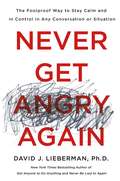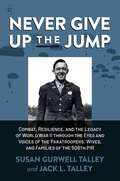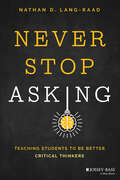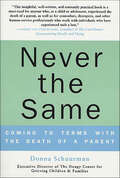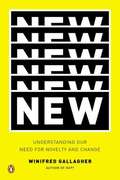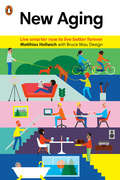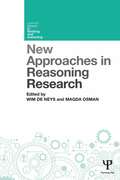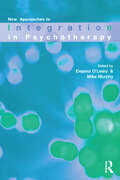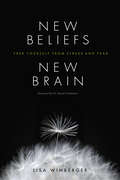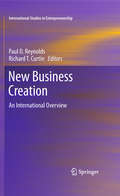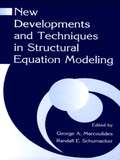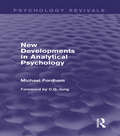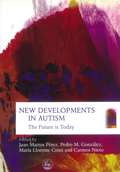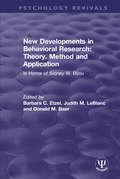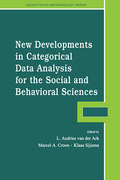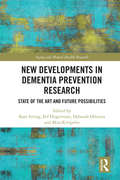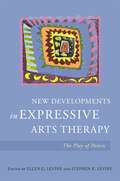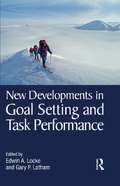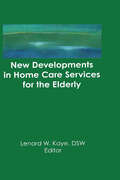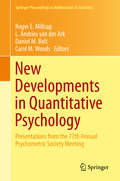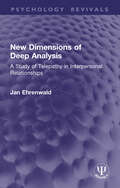- Table View
- List View
Never Get Angry Again: The Foolproof Way to Stay Calm and in Control in Any Conversation or Situation
by Dr David J. LiebermanNever Get Angry Again is New York Times and internationally bestselling author David J. Lieberman's comprehensive, holistic look at the underlying emotional, physical, and spiritual causes of anger, and a practical guide to what the reader can do to gain perspective.David J. Lieberman understands that a change in perspective is all that is needed to help keep from flying off the handle. In Never Get Angry Again, he reveals how to see anger through a comprehensive, holistic lens, illuminates the underlying emotional, spiritual, and physical components of anger, and gives the readers simple, practical tools to snuff out anger before it even occurs.Take a deep breath and count to ten. Meditate. Visualize your happy place. You’ve probably heard all of these anger management techniques and more from friends, family, and experts, but somehow they miss the mark when it comes to coping with the complex emotion of anger. Let’s face it: if anger-management techniques were effective, you wouldn’t be reading this book. These clumsy attempts to maintain calmness are usually futile and sometimes emotionally draining. The fact is, either something bothers us (causing anxiety, frustration, or anger), or it doesn’t. A state of calm is better accomplished by not becoming agitated in the first place. When we fight the urge to blow up or melt down, we fight against our own nature.
Never Give Up the Jump: Combat, Resilience, and the Legacy of World War II through the Eyes and Voices of the Paratroopers, Wives, and Families of the 508th PIR
by Susan Gurwell Talley Jack L. TalleyThe daughter of a D-Day paratrooper and her husband, a PTSD therapist, discover a family legacy of love, trauma, and resilience when they set out to explore a vast trove of WWII correspondence, official military documents, personal effects, and unique militaria found in closets and basements after her father&’s death.Young Sue Gurwell had always known that her father had been a paratrooper. An old camo parachute from Holland served as her backyard tent, and high on a shelf she mustn&’t touch, eight red devils in parachutes grinned from the front of mysterious drinking glasses Dad had sent Mom during the war. And then there was the special poem in his roll-top desk she sometimes snuck a peek at, written by a member of Dad&’s regiment. This poem was a premonition of the sergeant&’s death. &“Yes,&” her dad told her, &“He was right—he died on D-Day.&” But it&’s not until 2016, after her parents had both passed away, that Susan Gurwell Talley and her husband Jack L. Talley begin to understand the true extent and significance of the wartime artifacts that had been staples of Sue&’s childhood. The Talley&’s discovered that Sue&’s father, Lt. George L. Gurwell, Executive Officer, HqHq, 508th PIR, had silently squirreled away thousands of wartime documents in the family home. Like most combat veterans, George was never one to talk about the war; but the historic collection of official records, correspondence, photographs, maps, memorabilia, cultural artifacts, and unique ephemera constitute quite possibly the most extensive, various, and complete documentation of the 508th held privately today. This precious resource could not have passed into better hands than those of Jack and Sue Talley. Jack, a PhD psychologist specializing in PTSD, was the first to understand that George had PTSD symptoms that still lingered from the war years when he and George were introduced on June 6, 2001. That evening, the 57th anniversary of D-Day, George first opened up about the war, and preceded to talk late into the night. In that conversation lies the genesis of this book.
Never Leave a Man Behind: Around the Falklands and Rowing across the Pacific
by Mick Dawson'Mick Dawson's gripping Never Leave A Man Behind, effectively two adventure stories for the price of one, can be justifiably described as "unputdownable". Dawson is a man you would want on your side, whether in battle or tackling waves as high as houses should you ever consider rowing the Pacific.'Sports Book of the Month'An excellent read, it puts you in the boat, understanding what it's like to be in an extremely challenging environment while maintaining composure, cheerfulness and respect for your fellow men. I cannot recommend it highly enough'Keith M. Breslauer, Trustee of The Royal Marines Charity'Breathtaking - builds tension from the very start with life-and-death challenges throughout. Courage and comradeship at their very best, showing how mental and physical disabilities cannot and are not allowed to define or undermine the human self. Leaves you in awe and respect for one man determined to help his muckers win their battles whatever it takes - at great personal cost'Jonathan Ball, Director, The Royal Marines CharityThe stories of two veterans - one traumatised, one blind - who rediscover themselves with the help of a friend in the course of two epic ocean adventures, kayaking around the Falklands and rowing across the Pacific.Mick Dawson tells the story of kayaking around the Falkland Islands with friend and fellow Royal Marines veteran Steve Grenham, who was struggling to cope with the effects of Post-Traumatic Stress Disorder (PTSD), and the extraordinary tale of his 2,500-mile voyage in a rowing boat with his friend and former Royal Marine Commando Steve 'Sparky' Sparkes, who was not only a rowing novice, but also blind. Sparky and Mick succeeded in rowing across the finish line after a truly epic voyage of over 2,500 miles from Monterey Bay in California to Waikiki, Hawaii. They'd hoped to break the record for a two-man rowboat and finish in less than fifty-five days, but a hurricane interfered with their plans. It took them eighty-two days, sixteen hours and fifty-four minutes to complete the race, but it was an even greater achievement for that, and Sparky became the first visually impaired person to row across the Pacific.The race with Sparky was the second expedition of an organisation Mick had set up a few years earlier, The Cockleshell Endeavour, designed to help another former Royal Marine and friend, Steve Grenham, by kayaking with him around the Falklands, where both former commandos served during the 1982 conflict with Argentina.
Never Leave a Man Behind: Around the Falklands and Rowing across the Pacific
by Mick Dawson'Mick Dawson's gripping Never Leave A Man Behind, effectively two adventure stories for the price of one, can be justifiably described as "unputdownable". Dawson is a man you would want on your side, whether in battle or tackling waves as high as houses should you ever consider rowing the Pacific.'Sports Book of the Month'An excellent read, it puts you in the boat, understanding what it's like to be in an extremely challenging environment while maintaining composure, cheerfulness and respect for your fellow men. I cannot recommend it highly enough'Keith M. Breslauer, Trustee of The Royal Marines Charity'Breathtaking - builds tension from the very start with life-and-death challenges throughout. Courage and comradeship at their very best, showing how mental and physical disabilities cannot and are not allowed to define or undermine the human self. Leaves you in awe and respect for one man determined to help his muckers win their battles whatever it takes - at great personal cost'Jonathan Ball, Director, The Royal Marines CharityThe stories of two veterans - one traumatised, one blind - who rediscover themselves with the help of a friend in the course of two epic ocean adventures, kayaking around the Falklands and rowing across the Pacific.Mick Dawson tells the story of kayaking around the Falkland Islands with friend and fellow Royal Marines veteran Steve Grenham, who was struggling to cope with the effects of Post-Traumatic Stress Disorder (PTSD), and the extraordinary tale of his 2,500-mile voyage in a rowing boat with his friend and former Royal Marine Commando Steve 'Sparky' Sparkes, who was not only a rowing novice, but also blind. Sparky and Mick succeeded in rowing across the finish line after a truly epic voyage of over 2,500 miles from Monterey Bay in California to Waikiki, Hawaii. They'd hoped to break the record for a two-man rowboat and finish in less than fifty-five days, but a hurricane interfered with their plans. It took them eighty-two days, sixteen hours and fifty-four minutes to complete the race, but it was an even greater achievement for that, and Sparky became the first visually impaired person to row across the Pacific.The race with Sparky was the second expedition of an organisation Mick had set up a few years earlier, The Cockleshell Endeavour, designed to help another former Royal Marine and friend, Steve Grenham, by kayaking with him around the Falklands, where both former commandos served during the 1982 conflict with Argentina.
Never Stop Asking: Teaching Students to be Better Critical Thinkers
by Nathan D. Lang-RaadThe modern K-12 teacher's must-have guide to teach students how to ask questions, weigh the evidence, and think critically and independently Students and teachers alike face a dilemma: Why think deeply when we can just take a shortcut by googling something? Why read an article when we can learn from a social media headline? If, as educators, we want to encourage our students to value thoughtfulness and to embrace the effort it takes to reach deep understandings, we must model that behavior ourselves. In Never Stop Asking, author Dr. Nathan Lang-Raad shows K-12 teachers how human brains like to take mental shortcuts, known as heuristics, that allow the brain to save energy and perform more efficiently. These heuristics, however, can lead to illogical thinking, cognitive biases, and fallacies that can hinder critical thinking. Never Stop Asking: Teaching Students to be Better Critical Thinkers is the armor we need to defend ourselves and our students against the all-too-tempting shortcuts that the digital age has to offer, employing strategies to consistently and explicitly support teaching critical thinking and weaving it into the everyday landscape of your classroom. Let’s ensure that the students of today will be the skilled thinkers of tomorrow. Learn about common psychological shortcuts and biases that hinder students and teachers alike Discover the logic and the science behind critical thinking and why it leads to better outcomes Gain strategies to bring critical thinking into the classroom and help students build patience, discipline, and skill Acknowledge and embrace the digital age in your teaching—without falling victim to its downsidesThis is an engaging and important book for K-12 teachers and instructional coaches. Teacher training programs can also be enhanced by the practical wisdom and easy-to-implement strategies inside.
Never in Anger: Portrait of an Eskimo Family
by Jean L. BriggsIn the summer of 1963, anthropologist Jean Briggs journeyed to the Canadian Northwest Territories (now Nunavut) to begin a seventeen-month field study of the Utku, a small group of Inuit First Nations people who live at the mouth of the Back River, northwest of Hudson Bay. Living with a family as their “adopted” daughter—sharing their iglu during the winter and pitching her tent next to theirs in the summer—Briggs observed the emotional patterns of the Utku in the context of their daily life. In this perceptive and highly enjoyable volume the author presents a behavioral description of the Utku through a series of vignettes of individuals interacting with members of their family and with their neighbors. Finding herself at times the object of instruction, she describes the training of the child toward achievement of the proper adult personality and the handling of deviations from this desired behavior.
Never the Same: Coming to Terms with the Death of a Parent
by Donna SchuurmanChildren and teens who experience the death of a parent are never the same. Only in the last decade have counselors acknowledged that children grieve too, and that unresolved issues can negatively impact children into adulthood. Unaddressed grief can lead to depression, substance abuse, and relationship difficulties. For at least three generations of adults, these issues have been largely ignored. Having worked with thousands of families as Executive Director of the Dougy Center for Grieving Children, Donna Schuurman understands the dangers of unresolved grief better than anyone else. In Never the Same, Schuurman offers expert advice and encouragement to empower readers to reflect on their unique situation, come to terms with the influence of their parent's death, and live more healthful, peaceful lives.The only book of its kind, Never the Same is an essential companion for those still struggling with the early loss of a parent.
New
by Winifred GallagherAn exploration of how humans respond to novelty from the New York Times-bestselling author of Rapt Why are we attuned to the latest headline, diet craze, smartphone, and fashion statement? Why do we relish a change of scene, eye attractive strangers, and develop new interests? Follow a crawling baby around and you'll see that right from the beginning, nothing excites us more than something new and different. Our unique human brains are biologically primed to engage with and even generate novelty. This "neophilia" has enabled us to thrive in a world of cataclysmic change, but now we confront an unprecedented deluge of new things--one that shows no sign of slowing. In New acclaimed behavioral science writer Winifred Gallagher, using cutting-edge research and interviews with countless experts, shows us how we can use our adaptive gift to navigate more skillfully through our rapidly changing world by focusing on the new things that really matter.
New Aging: Live Smarter Now to Live Better Forever
by Matthias Hollwich Bruce Mau DesignAging is a gift that we receive with life--and in New Aging, the architect Matthias Hollwich outlines smart, simple ideas to help us experience it that way. New Aging invites us to take everything we associate with aging--the loss of freedom and vitality, the cold and sterile nursing homes, the boredom--and throw it out the window. As an architect, Matthias Hollwich is devoted to finding ways in which we can shape our living spaces and communities to make aging a graceful and fulfilling aspect of our lives. Now he has distilled his research into a collection of simple, visionary principles--brought to life with bright, colorful illustrations--that will inspire you to think creatively about how you can change your habits and environments to suit your evolving needs as you age. With advice ranging from practical design tips for making your home safer and more comfortable to thought-provoking ideas on how we work, relax, and interact with our neighbors, and even how we eat, New Aging will inspire you and your loved ones to live smarter today so you can live better tomorrow.From the Trade Paperback edition.
New Approaches in Reasoning Research: New Approaches In Reasoning Research (Current Issues in Thinking and Reasoning)
by Magda Osman Wim De NeysReasoning research has long been associated with paper and pencil tasks in which peoples’ reasoning skills are judged against established normative conventions. However, there has been a recent revolution in the range of techniques, empirical methods and paradigms used to examine reasoning behaviour. New Approaches in Reasoning Research brings to the fore these new pioneering research methods and empirical findings. Each chapter is written by a world-leading expert in the field and covers a variety of broad empirical techniques and new approaches to reasoning research. Maintaining a high level of integrity and rigor throughout, Editors De Neys and Osman have allowed the experts included here the space to think big about the general issues concerning their work, to point out potential implications and speculate on further developments. Such freedom can only help to stimulate discussion and spark creative thinking. The use of these new methods and paradigms are already generating a new understanding of how we reason, as such this book should appeal to researchers and students of Cognitive Psychology, Social Psychology, and Neuroscience along with Cognitive Scientists, and anyone interested in the latest developments in reasoning, rationality, bias, and thinking.
New Approaches to Early Child Development
by Hillel Goelman Jayne Pivik Martin GuhnGoelman, Pivik, and Guhnaddress a number of critical questions on early child development. What exactly is involved in conducting "interdisciplinary research" on early child development? What are the theoretical models that guide such approaches and how is such research accomplished in actual practice? This book volume describes a five-year journey of inquiry and discovery and the research findings of medical, health, and social scientists which provides an opportunity for scholars and professionals to reflect on the implications of this research for social policy and practice. "
New Approaches to Integration in Psychotherapy
by Eleanor O’Leary; Mike MurphyPsychotherapy is an area that has seen huge growth in prominence and practice. The range of theoretical schools that have emerged means that practitioners are striving to amalgamate and synthesise new approaches and theories. New Approaches to Integration in Psychotherapy provides a snapshot of the latest theoretical and clinical developments in the field of integration. Eleanor O'Leary and Mike Murphy bring together contributors from a range of theoretical backgrounds who present new frameworks, theoretical integrations, clinical developments and related research. They critique existing research and provide a thorough overview of the historical development of the movement towards integration in psychotherapy. The book is divided into three sections, covering the following subjects in depth: Frameworks and Theoretical Integrations Professional and Clinical Integrations and Special Populations Issues for Professional Consideration This book will be welcomed by anyone interested in investigating integrative approaches to psychotherapy. In particular, it will have direct relevance to academics involved in training and research on psychotherapy, psychotherapists, counsellors and clinical psychologists.
New Beliefs, New Brain
by David Perlmutter Lisa WimbergerStress is a silent killer that contributes to heart attacks, strokes, high blood pressure, depression, and suicide. Drawing from her own history with trauma and her experience in working with first responders and others in high stress occupations, Lisa Wimberger teaches powerful meditation practices that will improve the mental and emotional quality of life for those who are suffering. These techniques can be used at any time to turn back the body's clock, regenerate the mind, break negative patterns, and heal emotional wounds. Foreword by David Perlmutter, author of the # 1 bestselling Grain Brain.
New Business Creation
by Richard T. Curtin Paul D ReynoldsUnderstanding the origins of new businesses -- the firm creation process--has been dramatically affected by the development of longitudinal studies of business start-ups. Several projects have been implemented to track the development of new firms, from the emergence of a business idea and organization of a start-up team through the birth of an operational business. The U.S. projects (the first and second Panel Studies of Entrepreneurial Dynamics, known as PSED I and II) have counterparts in a number of other countries: Australia, Canada, China, Latvia, Netherlands (two projects), Norway, and Sweden. These eleven projects in nine countries, implemented over the past decade, are at different stages of development and have been utilized for a wide range of assessments of entrepreneurial and business creation phenomena. This volume presents the state of the art of these international research projects, providing the first in-depth comparison of the firm creation data across a wide range of national contexts. The work will be of great interest to the research community, particularly those developing such projects in their own countries, as well as policy makers and scholars interested in the effect of national context on the business creation process.
New Developments and Techniques in Structural Equation Modeling
by George A. Marcoulides Randall E. SchumackerFeaturing contributions from some of the leading researchers in the field of SEM, most chapters are written by the author(s) who originally proposed the technique and/or contributed substantially to its development. Content highlights include latent variable mixture modeling, multilevel modeling, interaction modeling, models for dealing with nonstandard and noncompliance samples, the latest on the analysis of growth curve and longitudinal data, specification searches, item parceling, and equivalent models. This volume will appeal to educators, psychologists, biologists, business professionals, medical researchers, and other social and health scientists. It is assumed that the reader has mastered the equivalent of a graduate-level multivariate statistics course that included coverage of introductory SEM techniques.
New Developments in Analytical Psychology (Psychology Revivals)
by Michael FordhamOriginally published in 1957, New Developments in Analytical Psychology built on the work of C.G. Jung. Jung’s researches into the unconscious had led him to study the history of religion and the hitherto little understood psychology of alchemy; they had directed him away from child psychology and also, in later years, away from clinical analysis as well. Nonetheless his discoveries and theories have essential relevance in both these spheres. All the papers in this volume complement and amplify Jung’s work. The author made a special study of child analysis and ego development and here publishes his conclusions in a series of papers. The studies of children led to developments in analytic techniques which are worked out in a longer essay on the transference, to the understanding of which analytical psychology has a unique contribution; they have also stimulated a reassessment of the relation between the concept of archetypes and modern theories of heredity, instinct, neuro-physiology, and evolution, in which there had been much misunderstanding at the time. Michael Fordham was the last of the founders of a movement in psychoanalysis, and pioneered the Jungian analysis of children. This significant, early work can now be read and enjoyed in its historical context.
New Developments in Autism: The Future is Today
by Manuel F. Casanova Maria Llorente Comi Sally Wheelwright Juan Marto Perez Pedro M. Gonzalez Carmen Nieto VizcainoThis international collection provides a comprehensive overview of cutting-edge research on autism spectrum disorders (ASDs) by well-known experts in the field, stressing the importance of early diagnosis and a good working relationship between parents and professionals. The contributors cover a wide range of aspects of ASDs, from early assessment techniques, neurodevelopment and brain function to language development, executive function and genetic research. They explore how individuals with ASDs think and give evidence-based guidance on how to handle difficulties with social interaction and language development using appropriate interventions. New Developments in Autism will be of great interest to professionals, researchers, therapists, parents and people with ASDs.
New Developments in Behavioral Research: In Honor of Sidney W. Bijou (Psychology Revivals)
by Barbara C. Etzel; Judith M. LeBlanc; Donald M. BaerOriginally published in 1977, these examples of research and scholarly argument were collected in honor of Professor Sidney W. Bijou. In the language of academics, they constitute a Festschrift: a festival of scholarly writing, performed to celebrate the career of a person who produced, and stimulated others to produce, exactly such contributions throughout a long, valuable, and productive professional history. Since 1955, Dr Bijou had worked almost exclusively within the approach variously labelled as the functional analysis of behavior, the experimental analysis of behavior, operant conditioning, or Skinnerian psychology. From his point of view, it seems clear, the first of these labels was the correct one. It was the principle of objective, direct, observable analysis that attracted him.
New Developments in Categorical Data Analysis for the Social and Behavioral Sciences (Quantitative Methodology Series)
by L. Andries van der Ark, Marcel A. Croon and Klaas SijtsmaCategorical data are quantified as either nominal variables--distinguishing different groups, for example, based on socio-economic status, education, and political persuasion--or ordinal variables--distinguishing levels of interest, such as the preferred politician or the preferred type of punishment for committing burglary. This new book is a collection of up-to-date studies on modern categorical data analysis methods, emphasizing their application to relevant and interesting data sets.This volume concentrates on latent class analysis and item response theory. These methods use latent variables to explain the relationships among observed categorical variables. Latent class analysis yields the classification of a group of respondents according to their pattern of scores on the categorical variables. This provides insight into the mechanisms producing the data and allows the estimation of factor structures and regression models conditional on the latent class structure. Item response theory leads to the identification of one or more ordinal or interval scales. In psychological and educational testing these scales are used for individual measurement of abilities and personality traits.The focus of this volume is applied. After a method is explained, the potential of the method for analyzing categorical data is illustrated by means of a real data example to show how it can be used effectively for solving a real data problem. These methods are accessible to researchers not trained explicitly in applied statistics. This volume appeals to researchers and advanced students in the social and behavioral sciences, including social, developmental, organizational, clinical and health psychologists, sociologists, educational and marketing researchers, and political scientists. In addition, it is of interest to those who collect data on categorical variables and are faced with the problem of how to analyze such variables--among themselves or in relation to metric variables.
New Developments in Dementia Prevention Research: State of the Art and Future Possibilities (Aging and Mental Health Research)
by Eef Hogervorst Kate Irving Deborah Oliveira Miia KivipeltoNew Developments in Dementia Prevention Research addresses a dearth of knowledge about dementia prevention and shows the importance of considering the broader social impact of certain risk factors, including the role we each play in our own cognitive health throughout the lifespan. The book draws on primary and secondary research in order to investigate the relationship between modifiable factors, including vascular and psychosocial risks, that may affect the incidence of dementia. Bringing together world-leading expertise from applied science, medicine, psychology, health promotion, epidemiology, health economics, social policy and primary care, the book compares and contrasts scientific and service developments across a range of settings. Each chapter presents these themes in a way that will ensure best practice and further research in the field of dementia prevention is disseminated successfully throughout the world. Perhaps most importantly, chapters also question what type of social responsibility we are prepared to embrace in order to address the challenges inherent in dementia prevalence. New Developments in Dementia Prevention Research includes contributions from leading authorities in brain health and dementia prevention and provides an essential contribution to the discourse on dementia prevention. It will be of great interest to academics, researchers and postgraduate students engaged in the study of the psychological and social aspects of aging and dementia.
New Developments in Expressive Arts Therapy: The Play of Poiesis
by Per Espen Stoknes Emily Miller Stephen K. Levine Ellen G. Levine Shaun Mcniff Herbert Eberhart Sally Atkins Carrie Macleod Paolo J. Knill Brigitte Wanzenried Elisabeth Hösli Elizabeth Gordon Mckim Isabelle Hayeur Jacques Stitelmann Jessica Gilway Judith Greer Essex Judy Nisenholt Kelly Clark Keefe Kelly Lycan Lisa Herman Majken Jacoby Margo Fuchs Knill Melinda Ashley Demott Peter Wanzenried Rebekah Windmiller Rosemary Faire Rowesa Gordon Sabine S. Silberberg Shara ClaireThis collection reflects on the theory and application of expressive arts today in therapy, education, research and social and ecological change. Bringing the understanding of expressive arts into its contemporary theoretical framework, the book reveals the expansion of the field from its initial focus on therapy alone into a diverse range of other areas of interest to therapists, educators, researchers and those interested in working for social and ecological change. The book also contains a selection of discursive writing, poetry and visual art, highlighting the importance of keeping artistic creativity at the heart of the field. With contributions from pioneering arts therapists, this will be vital reading for arts therapists and students in the field today.
New Developments in Goal Setting and Task Performance
by Gary P. Latham Edwin A. LockeThis book concentrates on the last twenty years of research in the area of goal setting and performance at work. The editors and contributors believe goals affect action, and this volume has a lineup of international contributors who look at the recent theories and implications in this area for IO psychologists and human resource management academics and graduate students.
New Developments in Home Care Services for the Elderly: Innovations in Policy, Program, and Practice
by Lenard W KayeThis anthology responds to the recurring call for quality in home care service provision. It presents to agency administrators, managers, supervisors, and front line service providers a set of the most up-to-date policy, program, and practice developments in the field. Each contributor to New Developments in Home Care Services for the Elderly explores issues of client/staff diversity and the challenges associated with working with clients grappling with disabling conditions.Contributors in New Developments in Home Care Services for the Elderly explore issues of client/staff diversity and the challenges associated with working with clients grappling with various disabling conditions. Topics addressed include: alternative organizational models in home care the importation of high technology services into the home legal and ethical issues in home health care counseling homebound clients and their families clinical assessment tools and packages case management and the home care client home care entitlements and benefits evaluating and monitoring the effectiveness of in-home care marketing home health care services home care service experiences in other countriesNew Developments in Home Care Services for the elderly covers a continuum of care ranging from housekeeping services to self-care education, teaching, and training services to nursing and medically related services. Consequently, the information contained within this volume is of immediate relevance to a multidisciplinary audience having both direct (field) and indirect (office) service responsibilities in the home care organization. Social workers, nurses, business administrators, and public health professionals will find this an invaluable guide for providing effective home care services.
New Developments in Quantitative Psychology
by L. Andries van der Ark Daniel M. Bolt Roger E. Millsap Carol M. WoodsThe 77th Annual International Meeting of the Psychometric Society (IMPS) brought together quantitative researchers who focus on methods relevant to psychology The conference included workshops, invited talks by well-known scholars, and presentations of submitted papers and posters. It was hosted by the University of Nebraska-Lincoln and took place between the 9th and 12th of July, 2012. The chapters of this volume are based on presentations from the meeting and reflect the latest work in the field. Topics with a primarily measurement focus include studies of item response theory, computerized adaptive testing, cognitive diagnostic modeling, and psychological scaling Additional psychometric topics relate to structural equation modeling, factor analysis, causal modeling, mediation, missing data methods, and longitudinal data analysis, among others The papers in this volume will be especially useful for researchers (graduate students and other quantitative researchers) in the social sciences who use quantitative methods, particularly psychologists Most readers will benefit from some prior knowledge of statistical methods in reading the chapters.
New Dimensions of Deep Analysis: A Study of Telepathy in Interpersonal Relationships (Psychology Revivals)
by Jan EhrenwaldOriginally published in 1954, New Dimensions of Deep Analysis was a systematic attempt at integrating facts which were once misrepresented as “occult” into the framework of modern dynamic psychiatry. Defining the concepts and criteria of so-called telepathic (or psi) phenomena, Dr Ehrenwald bases his discussion on a detailed analysis of a series of telepathic dreams observed in the psychoanalytic situation. These observations indicated that telepathy between analyst and patient, between mother and child – and in interpersonal relationships in general – was far more frequent and of much greater significance than was generally allowed for. Indeed, its very occurrence – described by the author as telepathic leakage – called for a revision and restatement of some of the classical propositions of psychoanalytic theory and practice, similar to that which had become necessary in the field of modern theoretical physics nearly half a century before. He redefines personality as an open versus a closed system made up of a three-fold stratification of ego-, id- and psi-levels. In his outline of what he describes as three-level therapy he tries to apply these concepts to the doctor-patient relationship and to come to grips with the magic element involved in the therapeutic process in accordance with established psychodynamic principles. Today it can be read in its historical context.
